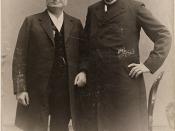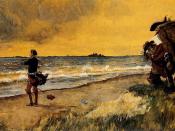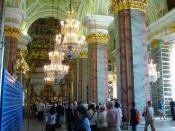Russian, Peter I, born on June 9th, 1672 in Moscow and dead February 8, 1725 in St.Petersburg, ameliorated immensely the life conditions for the Russian population, and hence, gaining the title of ÃÂGreat WesternizerÃÂ after becoming the new czar proceeding his grandfather, Michael Romanov. He was entitled with the laurel of ÃÂGreat WesternizerÃÂ because he accommodated Russia's medieval living system to the modern western type. The fact that he is called Great Westernizer instead of Poor Westernizer is a obvious proof of his success. Gavrila Golovkin, the state councilor of Peter I, asserts that Peter was "the Great, Father of His Country, Emperor of All the Russias". When he traveled throughout the western part of Europe, he noticed that the cities were much developed compared to his own and decided to modify it to make it as great as the west. The purpose of this essay is to determine to what extent Peter the Great was successful economically, socially, and politically and hence, whether he deserves his title of the ÃÂGreat Westernizer.ÃÂEconomically
speaking, Russia was still in it's medieval period while western Europe was beginning to modernize it's ways of income. One of Peter I's resolutions was to bring change to the economical system of Russia. One of his several main goals in his matter was to retrieve entry to the Baltic sea which would result in an economical evolution due to the trades advantages. In order for him to achieve this goal, Peter the Great entered war with Sweden in year 1700. This war lasted 21 years but resulted in favor of Russia with the control of immense Baltic land thus, ameliorating it's trade with the nearby countries. Joseph S. Roucek states in his university press paper that ÃÂit was only with the conquest of the Baltic provinces that Russia, under Peter the Great, was opened up to the West and became a European power.ÃÂ In 1703, the great city of St.Petersburg was founded and opened vast access to the Russians regarding the European trade routs. This granted them the possibility to become a major sea port. Another melioration that Peter the Great brought upon Russia is its commerce. Factories in all sorts of varieties were created thus making the commerce of the state improve. The prices were frozen by the government and private businesses could not make much profit because the successful companies were seized by the state. The economical status after the reformation of Peter I proved to be successful in the sense that the country arose from its mediocre medieval finance to a more complex and powerful economic system. As a ruler, he was successful because he accomplished the goals he set for his country. Nonetheless, in order to complete this essay and cover the major accomplishments of Peter I during his rule, one must take a look at the social and political aspects as well.
The social reforms that Peter the Great brought into his country were clear after he ruled, lives of the Russian community were forever, changed. He adopted the style of clothing, customs, manners, dances, and even ways of shaving that came from the western civilizations to his own state. This shows that he was completely fascinated by the western mode of life. The social hierarchy was modified into a more democratic way. K. Waliszewski, and Mary Loyd, writers of the book, Book, states that ÃÂthe claims of aristocratic origin should be balanced by the democratic claim of merit. A peasant might rise to official rank, and, by the fact of his becoming an officer, he became dvorianin (noble).ÃÂ This demonstrates the fact that the Russian hierarchy was modified into a less rigid classification fashion. The Emperor of 18th century Russia, Peter the Great, also made reformations to the cities that enhanced the life of citizens. These new buildings created served as schools to spread knowledge to the whole community. He had schools made for engineering, navigation and math, science, and medical schools. These schools allowed the people to have an education thus being able to accomplish many diverse affairs. The website historylearningsite.co.uk informs that ÃÂMany young noblemen were encouraged to do as Peter had done - go to western Europe and experience what it was like and also learn.ÃÂ This occurrence shows that the ideas placed by the schools in the newly educated minds of the people pushes them to go and want to learn on there own. Moreover these social reforms were accompanied with the political changes throughout Russia's metamorphosis from medievalism to the western way.
Similar to western Europe, Russia was starting to take a similar path regarding its political modifications. The politics during the time of the medieval era were influenced by many different rules. For example, during the thirteenth century, Russia was ruled by western influences. When Peter the Great came to rule, his political reformations were evident. He allowed his cities to elect their own officials and separated the country into eight parts called guberniia. These were separated into districts and provinces. Each of these guberniia were regulated by governors who responded directly to the czar, Peter I. These changes caused an immense modification in the Russian state. Simon Dixon states in his article that ÃÂa new narrative of Peter's reign makes clear the informal rules of the political game.ÃÂ This emphasizes on the fact that these conversions were significant. Alas, along with his two other important changes, the political developments created a more modern Russia.
The economical, social, and political modifications implied to Russia by the ÃÂGreat WesternizerÃÂ had a patent impact on the state. The western traditions that Peter the Great experienced during his voyage, made him realize that in order for his country to become an important power within Europe, he had to make changes. It is clear that Peter has earned his title of the ÃÂGreat WesternizerÃÂ and worked hard to get it. Peter says ÃÂI have conquered an empire but I have not been able to conquer myself.ÃÂ In order for one to fully understand this essay, one must ask himself, does success come from the accomplishments that one made throughout his life, or the accomplishments one made for himself?Bibliography:ÃÂ"Peter the Great: Biography from Answers.com." Answers.com: Wiki Q&A combined with free online dictionary, thesaurus, and encyclopedias. Web. 28 Jan. 2010. .
ÃÂ "History of St. Petersburg, Russia: Peter the Great (short biography)." St. Petersburg at Your Fingertips: City Guide and Travel Information Service. Web. 28 Jan. 2010. .
ÃÂ"Book review of 'RussiaÃÂs First World War. A Social and Economic History' by Peter Gatrell." Institute of Historical Research | The national centre for history. Web. 28 Jan. 2010. .
ÃÂ"Peter the Great - Domestic Reforms." History Learning Site. Web. 28 Jan. 2010. .
ÃÂ"Peter the Great - Government Reforms." History Learning Site. Web. 28 Jan. 2010. .
ÃÂ "Russia, to 1700." MacroHistory : World History. Web. 28 Jan. 2010. .
ÃÂ The Geopolitics of the Baltic States. By Joseph S. Roucek, 1949. Print.
ÃÂ "Peter the Great (Peter I)." Saint-Petersburg.com - travel and event guide for St Petersburg, Russia. Web. 28 Jan. 2010. .




